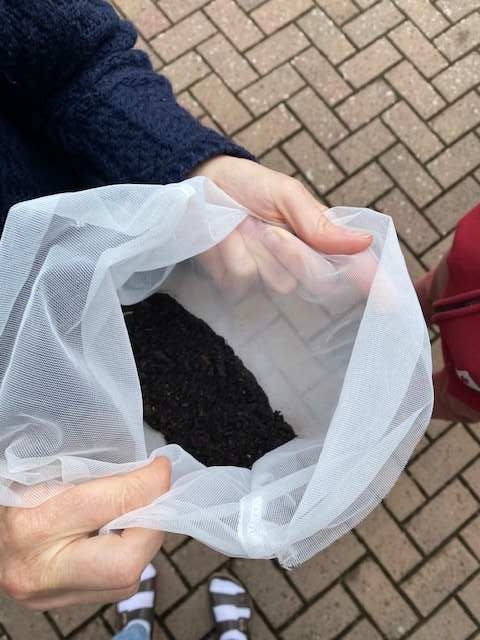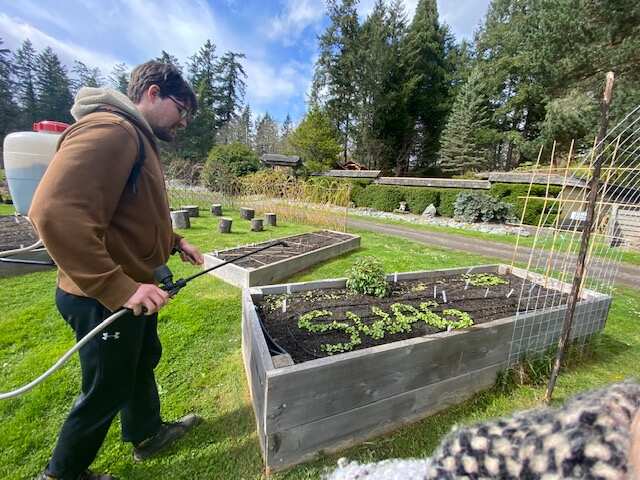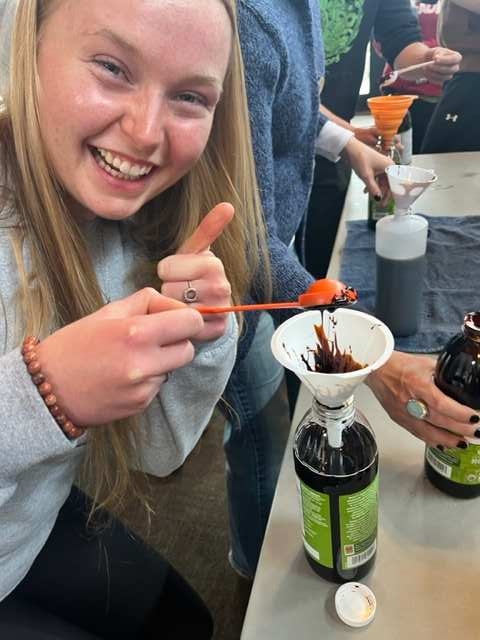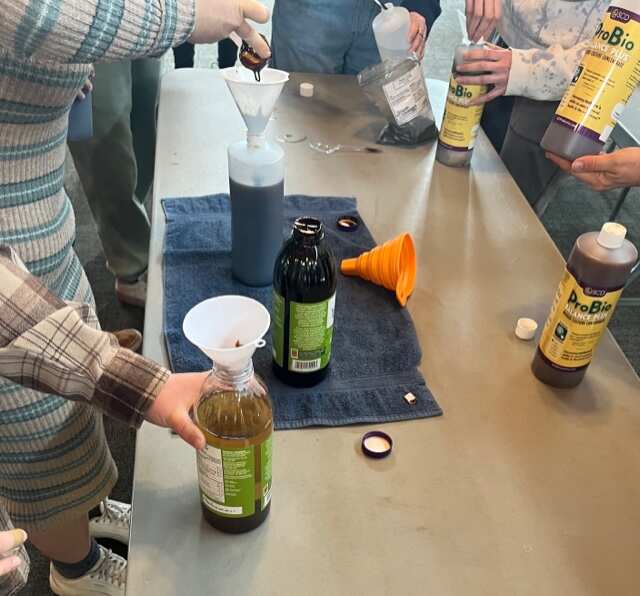Special Topics in Horticulture: Organic Landcare
Special Topics in Horticulture: Organic Landcare
Student Blog Post by Faith Brown and Megan Wong
Starting in April, the College hosted three lectures by Christina Cook on Organic Landcare. She has a degree in landscape design, has done landscaping, and since 2004 has taught at Gaia College. Christina has taken over The Organic Gardener's Pantry, which carries fundamental organic materials and products such as biochar and an organic mixture called ProBio. To understand Organic Landcare, one needs to understand what it means to be “organic”. Organic must be carbon-based and derived from plants or animals—not synthetic or poisonous. The practice of being organic must also support sustainability and ecosystems.
There are many ways to practice organic landcare as a home gardener. One can practice “chop and drop, " leaving some plant material to decompose and for other organisms to live in instead of clearing all old plant matter. In this same vein, leaving grass clippings on the lawn can help to add nitrogen back into the lawn. Less tilling and avoiding compaction are ways to prevent harming the soil organisms in the garden. Two other ways of using organic landcare are using EM or compost tea instead of synthetics. This blog plot will detail how to make both.
Probio, or EM, is a product that can go on soil and compost/mulch or be watered right into plants. It isn't regulated, as it is not a pesticide or a fertilizer. Christina taught the class how to make a daughter solution from the mother solution that she sells. Essentially, a mother sample is fed molasses which becomes the daughter solution after some time. It should have the same amount of microorganisms as the mother. The shelf life for the daughter solution is half a year, compared to the mother culture which can last 2 years. Store both in a cool, dark, and dry place.
How to make activated EM from the mother culture:
- 1 part EM mother to 1 part organic (unsulphured) blackstrap molasses (3 tbsp each/ 50ml) to 20 parts water (800 ml)
- Has to be unsulphured so it doesn't kill the EM (sulphur is a preservative and will kill microorganisms)
- Dissolve in water no hotter than 39 degrees
- Incubate in a warm area for a week or two (this isn't super necessary)
- Open the cap once a day as it ferments because CO2 is forming and needs to get out and shake it once a day
- You want the end pH to be 2.9-3.8
How to use the EM
- To use in soil/compost: dilute 1:100 (10ml/1L water)
- To use with indoor plants: dilute 1:200 or 1:1000 as the foliage is more sensitive
- Can be added to compost tea, exact measurements aren't needed as compost tea cannot ferment or kill microorganisms
AACT (Actively Aerated Compost Tea)
Benefits
Our class has had the privilege of Christina Cook coming into our classroom for the second time and attributing her passion which has found great success in sustaining the land by organic means. The goal is to maintain a healthy foundation for life. To sustain life by directly affecting the quality of the soil. She has discovered that one way to achieve this process of development is by using actively aerated compost tea. In the second organics class Christina has shared a multitude of benefits involving actively aerated compost tea. Some of the benefits entail improving the overall soil fertility by increasing soil and water retention, the AACT loosens clay soils by facilitating air and water to move through the soil while allowing sandy soils to retain moisture. AACT is a source for organisms, stimulates plant and root growth and reduces reliance on the need for chemical pesticides and fertilizers. Those properties previously discussed also increase plant yield since crops require nitrogen, phosphorus, potassium and other nutrients at the right levels to grow properly and yield well.
Ingredients and their benefits
Alpha Alpha meal - is a legume high in nitrogen. benefits soil microorganisms by helping them convert soil nutrients into soluble forms more available to plants. Alfalfa contains the naturally occurring growth hormone, Triacontanol, which boosts the growth rates of seedlings.
Black strap unsulphated molasses - feeds the beneficial microorganisms in the compost and also enriches the tea with iron. The importance of molasses is to feed the microbes.
Compost - Compost helps plant growth by balancing soil density. In soils that are too tightly compacted, compost helps to loosen the soil; whereas in compost that is too loose, it helps to clump the aggregates together.
How to make/procedures
1. Fill a 5 gal pail 3 quarters of the way with H20
2. Add all ingredients listed below in the 5 gallon pail (mix like a witch in her cauldron)
- Add 4 cups of compost
- 2 TBSP alpha alpha meal
- 2 TBSP black strap unsulphured molasses
3. Put in the air pump and allow your mixture to aerate for 12 to 48 hours. (People can vigorously stir the AACT but it will not be as effective.)
4. Tape the aerating device to the side of the bucket
How to Apply
- Fill up backpack sprayer with your newly made AACT
- Fill the backpack sprayer and use the AACT as quickly as possible to maximize its effectiveness.
- Can be sprayed on any landscape (Garden beds, farms etc.)
- There are no specific amounts of AACT that needs to be sprayed as compost tea will not kill microorganisms.
What we learned
After this process of making AACT we learned that we can enhance the overall natural state of life. By taking the beauty from nature it can invigorate its own overall health and vigour using properties from itself. Using nitrogen, water, oxygen and carbon that the plants offer, you can use them to improve the overall viability of your garden and landscapes. The plants grow stronger and at a faster rate when their environment appeals to them creating a strong foundation in aims to support and sustain. Increase soil fertility, cultivate, expand and produce.
For more information, visit The Organic Gardener's Pantry at https://www.gardenerspantry.ca/.






